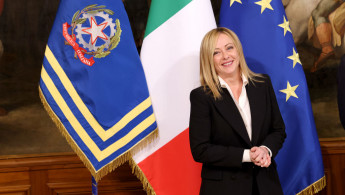Macron meets Italy's PM Meloni on post-fascist party leader's first day as premier
Italian Prime Minister Giorgia Meloni took her first steps on the international stage on Sunday, meeting French President Emmanuel Macron just hours after formally taking office.
The two leaders met away from the media for more than an hour in central Rome, after which Macron vowed in a post on Twitter to work together with "with dialogue and ambition".
Meloni's post-fascist Brothers of Italy scored a historic victory in general elections on 25 September.
Her new government is the most far-right in Italy since World War Two, and takes power at a time of soaring inflation and an energy crisis linked to Russia's invasion of Ukraine.
But there are already tensions within her coalition, which includes Matteo Salvini's far-right League and former premier Silvio Berlusconi's right-wing Forza Italia.
Meloni was forced this week to repeat her support for Ukraine and Western sanctions against Russia after Berlusconi was recorded defending President Vladimir Putin.
"We must be united, there are emergencies the country is facing. We have to work together," the 45-year-old told her first cabinet meeting on Sunday.
The prospect of a Eurosceptic, populist government leading the eurozone's third largest economy has sparked concern among Italy's allies, particularly in the European Union.
But European Commission President Ursula von der Leyen said she had a "good first call" Saturday with Meloni, saying she looked forward to "constructive cooperation".
'Friendly and fruitful'
Meloni's office described Sunday's talks with Macron as informal but "friendly and fruitful", covering the need for urgent and common action on high energy bills, support for Ukraine and migration.
"Meloni and Macron agreed on the willingness to continue to cooperate on the major common challenges at the European level and in respect of mutual national interests," it said in a statement.
A statement from Macron's office described the talks as "pragmatic and constructive", but also "frank".
Macron's aides had refused to confirm the meeting with Meloni until the last minute, and it came during his pre-planned trip to Rome and the Vatican.
In a tweet accompanied by a photo of him and Meloni on a rooftop at dusk, Macron insisted on the need for the two countries to keep working together, as Europeans, neighbouring countries and friends.
But Macron's entourage made it clear that they would judge Meloni on her actions.
Earlier, Macron posted a picture of outgoing prime minister Mario Draghi, with the words "Grazie [thank you] Mario".
Reassuring ministers
On Sunday, Meloni joined Draghi, a former European Central Bank chief in office since February 2021, for a symbolic handover of power.
They held private talks for almost 90 minutes before a smiling Draghi gave Meloni a small bell used in cabinet debates, which she, grinning, rang a few times for the television cameras.
My congratulations to @GiorgiaMeloni, the first female Prime Minister of Italy. I wish the new government to successfully respond to all the challenges of today. I look forward to continued fruitful cooperation to ensure peace and prosperity in Ukraine, Italy and the world!
— Володимир Зеленський (@ZelenskyyUa) October 22, 2022
As a teenage activist, Meloni praised late dictator Benito Mussolini, but insists fascism is history.
She has transformed her once-marginal party into a national force.
As the only real opposition to Draghi's national unity government, Meloni swept up disillusioned voters and secured 26 percent of the vote last month.
She presents herself as a straight-talking "Christian mother", a defender of traditional values and of Italy's national interests, but her party has never before held power.
Meloni has sought to reassure investors that Italy's debt-laden economy is safe in her hands, appointing Giancarlo Giorgetti as economy minister.
Giorgetti, economic development minister under Draghi, is considered one of the more moderate, pro-Europe members of Salvini's League.
Draghi's energy minister, Roberto Cingolani, will stay on as government adviser as Italy tries to wean itself off Russian gas, reports said.
Pope Francis had earlier marked the start of the new government in his weekly Angelus on Sunday, offering his prayers for "unity and peace in Italy".
Coalition tensions
Meloni's party no longer wants Italy to leave the EU's single currency but remains strongly Eurosceptic, as is the League, which won nine percent in the elections.
However, she named as foreign minister and deputy prime minister Antonio Tajani, a former president of the European Parliament who co-founded Forza Italia with Berlusconi.
Their party won eight percent of the vote last month.
Salvini will serve as deputy prime minister and minister of infrastructure and transport.
Like Berlusconi, Salvini is a long-time admirer of Putin and has criticised Western sanctions imposed on Russia over its invasion of Ukraine.
The tensions with her allies reinforce doubts as to how long Meloni can keep her coalition together, in a country that has had almost 70 governments since 1946.
On Saturday, she again affirmed her desire to work with NATO, "a bulwark of common values we'll never stop standing for".
NATO chief Jens Stoltenberg and US President Joe Biden sent their congratulations, as did Ukrainian leader Volodymyr Zelensky.





 Follow the Middle East's top stories in English at The New Arab on Google News
Follow the Middle East's top stories in English at The New Arab on Google News
![The UAE is widely suspected of arming the RSF militia [Getty]](/sites/default/files/styles/image_330x185/public/2024-11/GettyImages-472529908.jpg?h=69f2b9d0&itok=Yauw3YTG)
![Netanyahu furiously denounced the ICC [Getty]](/sites/default/files/styles/image_330x185/public/2024-11/GettyImages-2169352575.jpg?h=199d8c1f&itok=-vRiruf5)
![Both Hamas and the Palestinian Authority welcomed the ICC arrest warrants [Getty]](/sites/default/files/styles/image_330x185/public/2024-11/GettyImages-2178351173.jpg?h=199d8c1f&itok=TV858iVg)